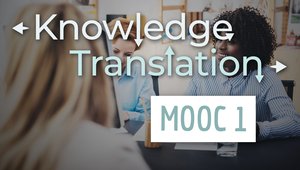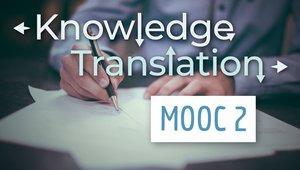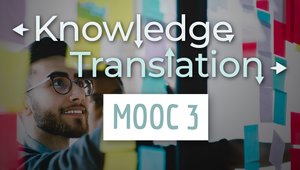Knowledge Translation
Series of 3 courses in EDUlib
Studies on the subject show that the process leading to the use of knowledge is so complex that science and research still barely get taken into account in practice and decision-making communities. There is consensus in scientific literature that the efforts made to make scientific knowledge available are necessary, but not sufficient, for their actual use in practice communities. These courses have been designed to address these issues.
This series of free online courses was developed by the RENARD research team (équipe de Recherche sur les Effets Non-Académiques de la Recherche et ses Déterminants) in collaboration with the IRD (Institut de Recherche pour le Développement) and with the support of Université de Montréal’s CPU (Centre de pédagogie universitaire).
What you will learn in this program:
MOOC 1 is an introduction to Knowledge Translation. It offers you a chance to familiarize yourself with the basic concepts of knowledge translation and learn to identify the factors that promote or discourage knowledge use. The most effective mechanisms for optimizing research use will be presented to you. You can start learning about several knowledge translation tools and activities (infographics, policy briefs, deliberative dialogues, etc.).
The second MOOC in the series focuses exclusively on the preparation of policy briefs. By the end of this course, you will be able to distinguish between different types of policy briefs and identify key elements that characterize their effectiveness. In addition, you will learn more about the different steps involved in producing a policy brief and the different choices that must be made with regards to its content. You will therefore be better equipped to prepare your own clear, rigorous, credible and convincing policy briefs.
The third MOOC in the series focuses on knowledge brokering. Knowledge brokering is a strategy of intermediation between research, practice, and decision-making. This MOOC will allow you to familiarize yourself with the main activities of a knowledge broker, such as developing a brokering mandate, managing and synthesizing knowledge, facilitating stakeholder networks, building capacity, or planning a knowledge translation process and supporting change.
Knowledge Translation 1 – Introduction
By the end of this MOOC, you will be better prepared to plan a translation process and evaluate its impact.
Module Overview
- Module 1 - Basic Concepts of Knowledge Translation
- Module 2 - Research on Knowledge Translation
- Module 3 - Planning a Knowledge Translation Process
- Module 4 - Knowledge Brokering
- Module 5 - Developing Knowledge Translation Tools - Policy Brief, Infographic and Video
- Module 6 - Preparing an Oral Presentation and Slideshow
- Module 7 - Organizing a Deliberative Workshop
- Module 8 - Evaluating the Impact of Knowledge Translation
Knowledge Translation 2 – Policy Brief
By the end of this course, you will be able to distinguish between different types of policy briefs and identify key elements that characterize their effectiveness.
Module Overview
- Module 1 – What is a policy brief?
- Module 2 – What does the research on policy briefs say?
- Module 3 – What are the key characteristics of a convincing policy brief?
- Module 4 – How do you prepare a policy brief?
- Module 5 – How do you write and present a policy brief effectively?
Knowledge Translation 3 – Knowledge Brokering
By the end of this course, you will be able to identify the different activities that a knowledge broker can perform, as well as the skills required to carry out these activities. You will be able to describe the various steps needed to carry out a brokering approach.
Module Overview
- Module 1 – Introduction to knowledge brokering
- Module 2 – Preparing and planning a knowledge brokering mandate
- Module 3 – Evidence-based problem-solving (for decision-making)
- Module 4 – The different methods for systematic reviews of scientific knowledge
- Module 5 – Adapting and disseminating knowledge: the knowledge translation toolkit
- Module 6 – Supporting a change process




